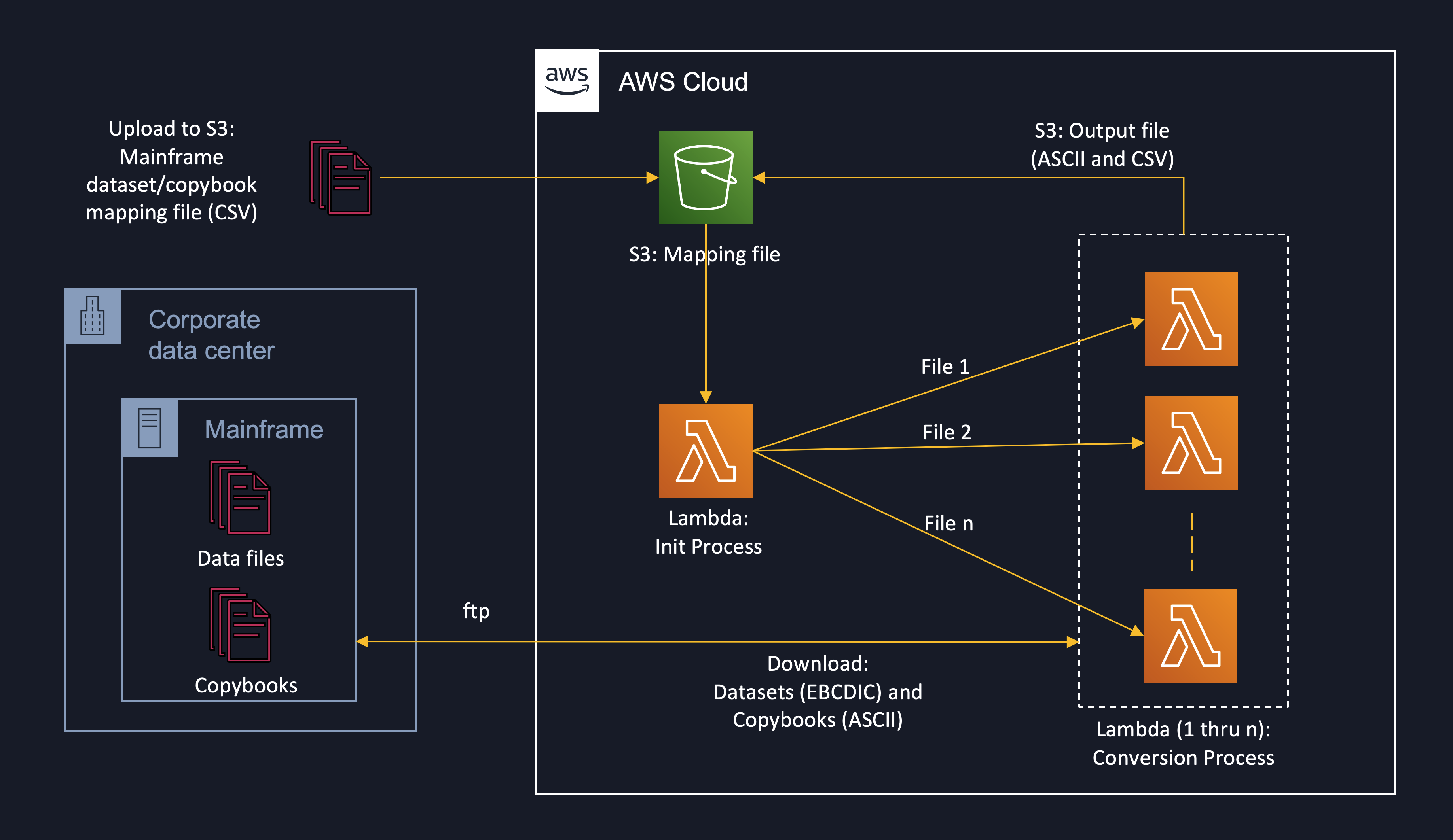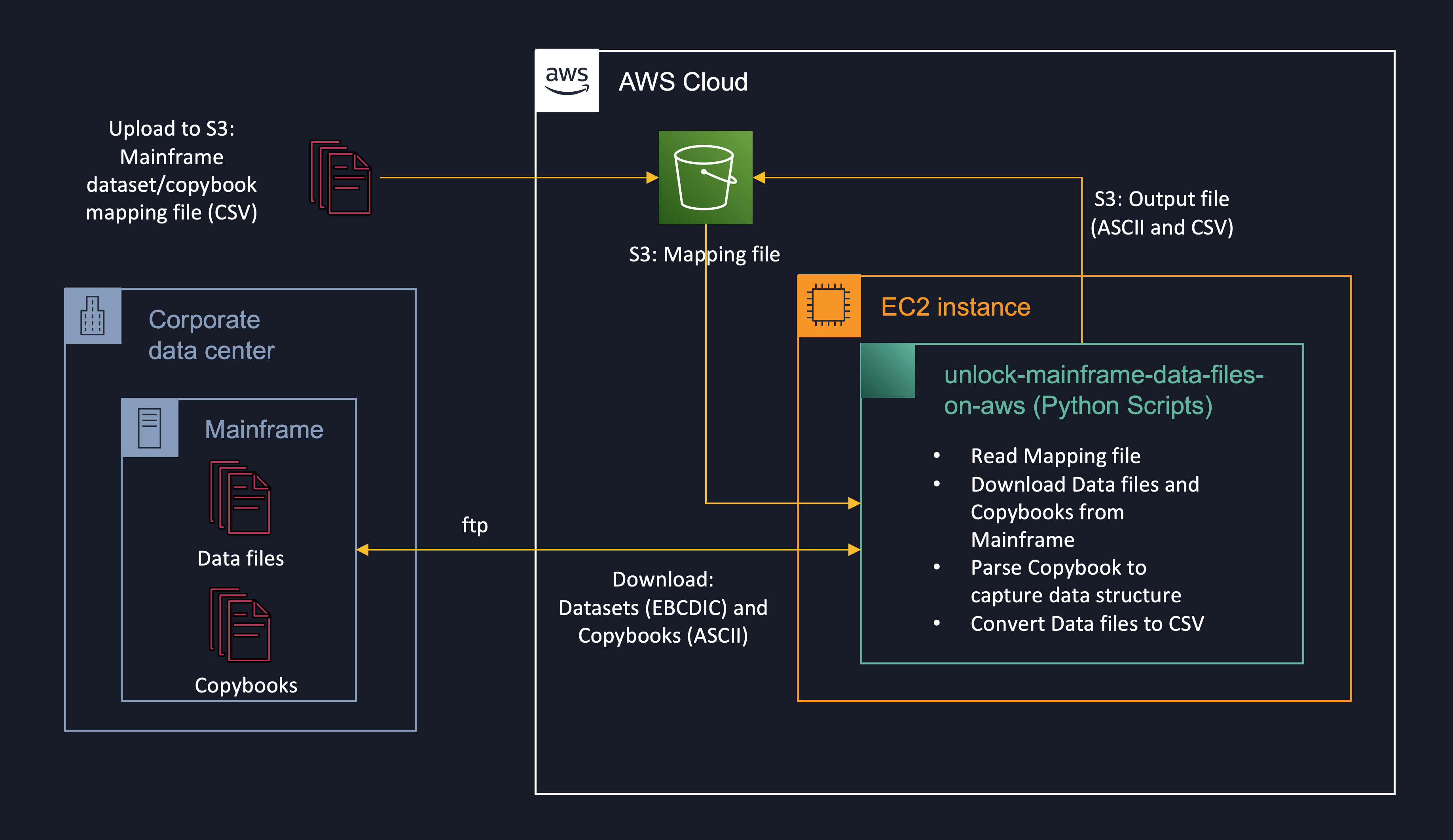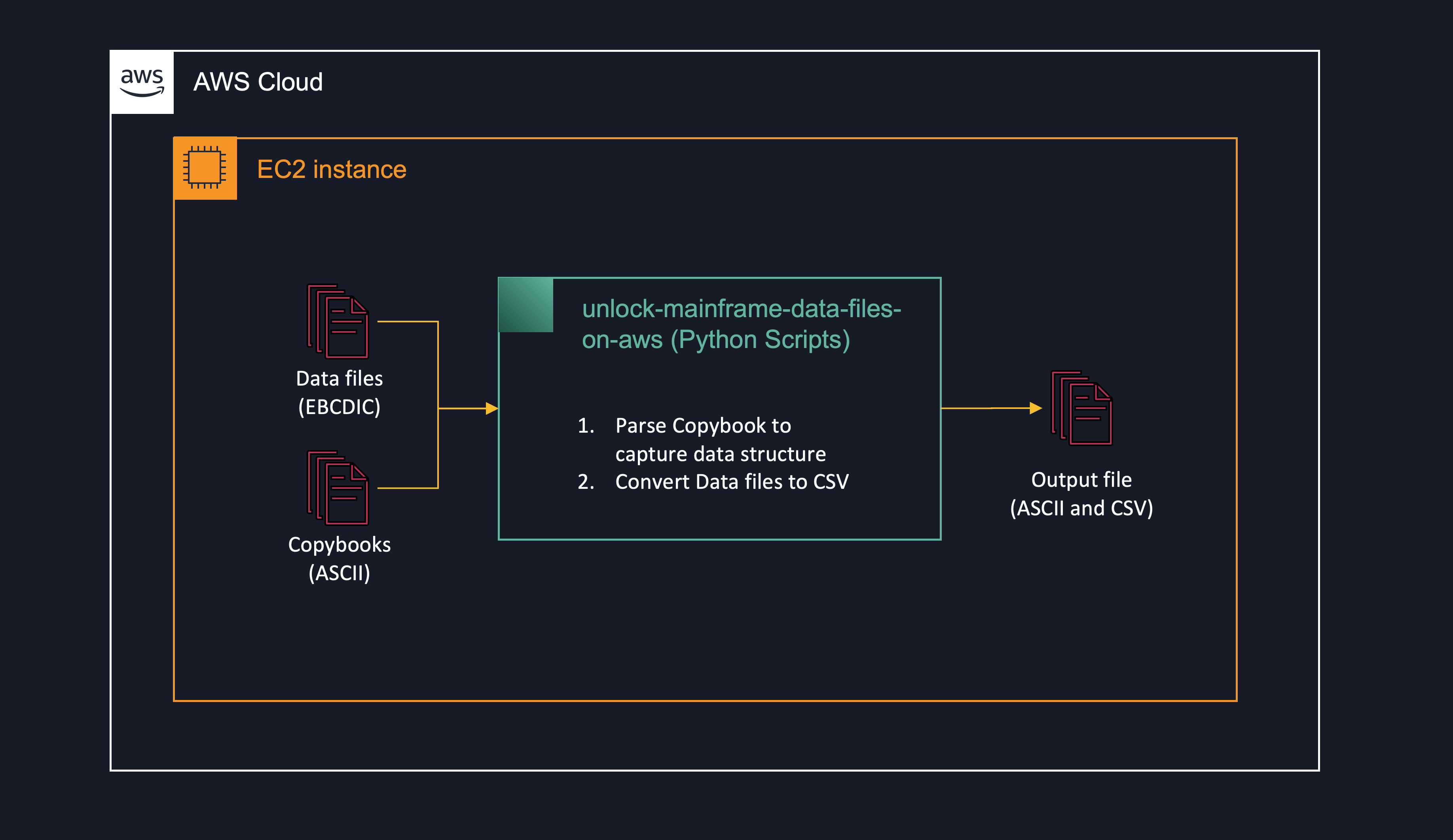This solution is designed to help you unlock legacy mainframe data by migrating data files from mainframe systems to AWS. By migrating the data, you can make use of the powerful analytics, machine learning, and other services available in AWS to gain insights and make better decisions based on the data. Additionally, you can also take advantage of the scalability and cost savings of cloud computing. The solution involves transferring data from mainframe datasets, converting it into a CSV format, and then storing the data in AWS. Finally, you can use the AWS services to analyze and process the data to gain insights and derive greater value from your legacy data files.
Currently, the project supports the following features:
Dataset types:
The solution assumes that the input dataset is a Physical Sequential (PS) with Fixed Block (FB) record length. If you have other datasets that are not in PS with FB format, you can convert them to this format on the mainframe using various JCL utility programs such as SORT for Variable Block (VB) datasets or IDCAMS REPRO for Virtual Storage Access Method (VSAM) datasets.
Data types:
- COMP-3 or Packed Decimal
- COMP or Binary
- Zoned Decimal
- Alphanumeric
- Numeric
Complex structures:
- REDEFINES (including at 01 level)
- OCCURS and Nested OCCURS
Output Format:
- CSV (comma separated)
This means the solution/script is able to handle and convert mainframe data files that use these datatypes and complex structures, and output the converted data in CSV format.
Currently, the project has the following limitations:
- It does not support variable record length (VB) files
- It does not support OCCURS DEPENDING ON clause in copybook
Current Release
- v1.0 - Initial version
This solution offers three different deployment options: Lambda-based, EC2-based, and Run Anywhere. Depending on the deployment method you have selected, you need to follow the instructions for that particular deployment option.
In this architecture, two Lambda functions are used to automate the mainframe data conversion process. The user uploads a mapping file, containing the mapping between mainframe datasets and copybooks, to an input folder in an S3 bucket. This triggers the initialization process Lambda function. For each file read by the initialization Lambda function, a conversion process Lambda function is invoked. The conversion function downloads the dataset and copybook files from the mainframe system using FTP, parses the copybook, and converts the dataset to CSV format. The produced output file is then uploaded to an output folder in the S3 bucket. This architecture allows for a scalable and efficient process for converting mainframe datasets to CSV format and provides a way to automate the process.
For the Lambda-based deployment, you need to follow these steps:
- Clone the GitLab project using the command
git clone <project_url>in the command line or terminal. - Navigate to the folder named
lambda_basedwithin the cloned project. - Use a command line tool or GUI tool to create a zip file of the contents of the folder
lambda_based\mf-unlock-data-init. This file should be namedmf-unlock-data-init.zip - Repeat step 3 for the folder
lambda_based\mf-unlock-dataand name the zip filemf-unlock-data.zip - Sign in to the AWS Console, navigate to the Lambda service, and click on the "Create function" button. Select the "Author from scratch" option and give the function a name of
mf-unlock-data-init. Select a runtime that is compatible with the source code. - Under the "Function code" section, select the "Upload a .zip file" option and upload the
mf-unlock-data-init.zipfile created in step 3. - Repeat steps 5 and 6 to create a new Lambda function called
mf-unlock-dataand upload themf-unlock-data.zipfile. - Open the
src\config.pyfile and modify the following variables to match your environment:codepage- The codepage of the mainframe datasets to be convertedftp_host- The hostname or IP address of the mainframe FTP serverftp_port- The port number for the mainframe FTP serverftp_timeout- The timeout value for the FTP connectionftp_user- The username for the FTP accountftp_passwd_b64- The base64 encoded password for the FTP accounts3_bucket_name- The name of the S3 bucket where the files will be storeds3_mfdata_input_dir- The directory within the S3 bucket where mainframe dataset/copybook mapping files will be uploadeds3_mfdata_output_dir- The directory within the S3 bucket where the converted CSV files will be storeds3_mfdata_work_dir- The directory within the S3 bucket used for temporary storage during the conversion processlambda_work_dir- The working directory for the Lambda function
- In the AWS S3 service, create a new S3 bucket with the name specified in
s3_bucket_namevariable. Then create three folders within the bucket with names matching the values of thes3_mfdata_input_dir,s3_mfdata_output_dir, ands3_mfdata_work_dirvariables. - In the AWS Lambda service, navigate to the
mf-unlock-data-initfunction and under the "Designer" section, select "S3" from the "Add triggers" list and configure the trigger to listen for file uploads to thes3_mfdata_input_dirfolder in the S3 bucket. - Upload the mainframe dataset/copybook mapping file to the
s3_mfdata_input_dirfolder in the S3 bucket. This file will be used to map the mainframe dataset and copybook files that need to be converted. - Once the mapping file is uploaded, the
mf-unlock-data-initLambda function will be triggered automatically if configured correctly. The function will use the FTP connection information and dataset/copybook mapping to download the mainframe files and convert them to ASCII CSV format. - The converted CSV files will be stored in the
s3_mfdata_output_dirfolder in the S3 bucket. - Verify that the conversion process was successful by checking the contents of the
s3_mfdata_output_dirfolder. Make sure that the CSV files are in the correct format and contain the expected data.
In this architecture, an EC2 instance is used for the compute instead of using Lambda functions. The python scripts from the project are downloaded into an EC2 instance. Once the scripts are downloaded, the EC2 instance will be used to perform the conversion process. The script reads the previously uploaded mapping file from an S3 bucket, downloads the dataset and copybook files from the mainframe system using FTP, parses the downloaded copybook and converts the dataset to CSV format using the information from the copybook. The resulting CSV file is then uploaded back to an S3 bucket. This architecture allows for more compute resources to be allocated to the conversion process than would be possible with a Lambda-based approach.
For the EC2-based deployment, you need to follow these steps:
- On the EC2 instance, use the command
git clone <project_url>in the command line or terminal to clone the GitLab project. - Navigate to the folder named
ec2_basedwithin the cloned project. - Open the
src\config.pyfile and modify the following variables to match your environment:codepage- The codepage of the mainframe datasets to be convertedftp_host- The hostname or IP address of the mainframe FTP serverftp_port- The port number for the mainframe FTP serverftp_timeout- The timeout value for the FTP connectionftp_user- The username for the FTP accountftp_passwd_b64- The base64 encoded password for the FTP accounts3_bucket_name- The name of the S3 bucket where the files will be storeds3_mfdata_input_dir- The directory within the S3 bucket where mainframe dataset/copybook mapping files will be uploadeds3_mfdata_output_dir- The directory within the S3 bucket where the converted CSV files will be storeds3_mfdata_work_dir- The directory within the S3 bucket used for temporary storage during the conversion processs3_dataset_mapping_file- The name of the dataset/copybook mapping file that will be uploaded to S3 input folderec2_work_dir- The working directory for the script on the EC2 instance
- In the AWS S3 service, create a new S3 bucket with the name specified in
s3_bucket_namevariable. Then create three folders within the bucket with names matching the values of thes3_mfdata_input_dir,s3_mfdata_output_dir, ands3_mfdata_work_dirvariables. - Using the S3 web interface or AWS CLI, upload the mainframe dataset/copybook mapping file, specified in
s3_dataset_mapping_filevariable, to thes3_mfdata_input_dirfolder in the S3 bucket. - On the EC2 instance, navigate to the
ec2_basedfolder and execute the scriptsrc\main.pyusing the commandpython src/main.py. - The script will use the FTP connection information and dataset/copybook mapping to download the mainframe files and convert them to ASCII CSV format.
- The converted CSV files will be stored in the
s3_mfdata_output_dirfolder in the S3 bucket. - Verify that the conversion process was successful by checking the contents of the
s3_mfdata_output_dirfolder. Make sure that the CSV files are in the correct format and contain the expected data.
The "Run anywhere" deployment option allows you to run this solution/script on any system that has python installed. It processes the already downloaded mainframe copybooks and data files, and converts them into a CSV file. The input and output files are stored on the same system where the script is running, so no external dependencies are required. This option provides flexibility in running the script as it can be run in any environment whether it is on-premises or on cloud.
For the Run Anywhere deployment, you need to follow these steps:
- Clone the GitLab project using the command
git clone <project_url>in the command line or terminal. - Navigate to the folder named
run_anywherewithin the cloned project. - Open the
src\config.pyfile and modify thecodepagevariable to match the codepage of the mainframe datasets to be converted. - Open the
src\main.pyfile and modify the following variables to match the location of the mainframe dataset and copybook files:input_copybook- The path to the mainframe copybook fileinput_datafile- The path to the mainframe dataset fileoutput_datafile- The path to the location where the converted CSV file will be saved
- In the
mfdatafolder, create two subfolderscopybookandinputand place the mainframe copybook and dataset files respectively. - On the command line or terminal, navigate to the
run_anywherefolder and execute the scriptsrc\main.pyusing the commandpython src/main.py. - The script will use the mainframe dataset and copybook files to convert the data to ASCII CSV format and store the output file in the
mfdata\outputfolder - Verify that the conversion process was successful by checking the contents of the
mfdata\outputfolder. Make sure that the CSV files are in the correct format and contain the expected data.
The mapping file used in this solution should be in a comma-separated format and should contain a header with the following columns:
- DatasetName: The name of the mainframe dataset
- CopybookName: The name of the corresponding copybook
This file should have one entry per line, where each entry maps a dataset to its corresponding copybook. This file can have many entries, allowing the script to process multiple datasets and copybooks. The script uses this mapping file to determine which datasets and copybooks to download and convert.
dataset_mapping.csv
DatasetName,CopybookName
AWS.M2.CARDDEMO.ACCTDATA.PS,AWS.M2.CARDDEMO.CPY(CVACT01Y)
AWS.M2.CARDDEMO.CUSTDATA.PS,AWS.M2.CARDDEMO.CPY(CVCUS01Y)
*
* Sample Employee Record COBOL Layout
*
01 EMP-RECORD.
05 EMP-ID PIC 9(5).
05 EMP-ID-X REDEFINES EMP-ID PIC X(5).
05 EMP-NAME PIC X(25).
05 EMP-DOB PIC X(10).
05 EMP-ADDRESS OCCURS 3 TIMES.
10 EMP-ADDR-LINE PIC X(25).
05 EMP-YOE-CUR PIC S9(4) COMP.
05 EMP-YOE-TOTAL PIC 9(4)V99 COMP-3.
05 EMP-SALARY PIC S9(4)V99.
05 EMP-SALARY-DIFF PIC S9999V99 COMP-3.
05 EMP-DEPENDENTS-NUM PIC S9(2).
05 FILLER PIC X(17).#
# Hex dump of TEST.EMP.RECORD.FILE.dat
#
$ xxd -EBCDIC TEST.EMP.RECORD.FILE.dat
00000000: f0f0 f0f0 f1d1 8595 9589 8685 9940 c396 00001Jennifer Co
00000010: 9693 85a8 4040 4040 4040 4040 4040 f0f7 oley 07
00000020: 61f1 f161 f1f9 f8f2 d74b d64b 40c2 96a7 /11/1982P.O. Box
00000030: 40f4 f3f3 6b40 f3f0 f3f1 40e2 8594 40c1 433, 3031 Sem A
00000040: a5c9 9584 8981 4040 4040 4040 4040 4040 vIndia
00000050: 4040 4040 4040 4040 4040 f6f9 f3f6 f2f4 693624
00000060: 4040 4040 4040 4040 4040 4040 4040 4040
00000070: 4040 4000 0800 0170 0ff7 f3f5 f4f0 c400 ......73540D.
00000080: 6128 3cf0 c240 4040 4040 4040 4040 4040 /..0B
00000090: 4040 4040 4040 f0f0 f0f0 f2d7 81a3 8985 00002Patie
000000a0: 9583 8540 c881 95a2 9695 4040 4040 4040 nce Hanson
000000b0: 4040 4040 f1f0 61f0 f461 f1f9 f8f5 c197 10/04/1985Ap
000000c0: 407b f8f3 f960 f8f5 f9f8 40d5 a493 9381 #839-8598 Nulla
000000d0: 40c1 a585 95a4 85c6 9981 9583 8540 4040 AvenueFrance
000000e0: 4040 4040 4040 4040 4040 4040 4040 4040
000000f0: f9f0 f4f8 f7f8 4040 4040 4040 4040 4040 904878
00000100: 4040 4040 4040 4040 4000 0200 0160 0ff2 ....-.2
00000110: f1f5 f5f3 c300 1796 1df0 c340 4040 4040 1553C..o.0C
00000120: 4040 4040 4040 4040 4040 4040 f0f0 f0f0 0000
00000130: f3c9 8795 8183 8981 40d3 a895 8388 4040 3Ignacia Lynch
00000140: 4040 4040 4040 4040 4040 f1f2 61f1 f461 12/14/
00000150: f1f9 f8f4 f7f1 f160 f6f7 f0f9 40d6 9995 1984711-6709 Orn
00000160: 8199 856b 40d9 844b 4040 4040 40c9 9584 are, Rd. Ind
00000170: 9695 85a2 8981 4040 4040 4040 4040 4040 onesia
00000180: 4040 4040 4040 f5f6 f1f1 f2f8 4040 4040 561128
00000190: 4040 4040 4040 4040 4040 4040 4040 4000 .
000001a0: 0200 0170 0ff9 f1f8 f6f5 c400 7655 4cf0 .....91865D...<0
000001b0: c340 4040 4040 4040 4040 4040 4040 4040 C
000001c0: 4040 f0f0 f0f0 f4d4 8199 8981 9440 c485 00004Mariam De
000001d0: 9185 a2a4 a240 4040 4040 4040 4040 4040 jesus
000001e0: f0f8 61f1 f861 f1f9 f7f8 d74b d64b 40c2 08/18/1978P.O. B
000001f0: 96a7 40f9 f1f4 6b40 f6f1 f2f8 40e2 8594 ox 914, 6128 Sem
00000200: 6b40 e2e3 a499 9285 a840 4040 4040 4040 , STurkey
00000210: 4040 4040 4040 4040 4040 4040 f4f6 f3f0 4630
00000220: f740 4040 4040 4040 4040 4040 4040 4040 7
00000230: 4040 4040 4000 0100 0180 0ff1 f8f9 f0f3 ......18903
00000240: c200 1575 2cf0 c440 4040 4040 4040 4040 B....0D
00000250: 4040 4040 4040 4040 f0f0 f0f0 f5d2 85a5 00005Kev
00000260: 8995 40c1 9584 8599 a296 9540 4040 4040 in Anderson
00000270: 4040 4040 4040 f0f7 61f0 f161 f1f9 f9f3 07/01/1993
00000280: d74b d64b 40c2 96a7 40f9 f8f9 6b40 f7f8 P.O. Box 989, 78
00000290: f3f1 40d4 81a4 9989 a2e3 a499 9285 a840 31 MaurisTurkey
000002a0: 4040 4040 4040 4040 4040 4040 4040 4040
000002b0: 4040 f4f7 f4f4 f1f1 4040 4040 4040 4040 474411
000002c0: 4040 4040 4040 4040 4040 4000 0500 0210 .....
000002d0: 0ff5 f6f1 f9f5 c000 4682 9df0 c440 4040 .56195{..b.0D
000002e0: 4040 4040 4040 4040 4040 4040 4040
"EMP_ID","EMP_ID_X","EMP_NAME","EMP_DOB","EMP_ADDR_LINE_1","EMP_ADDR_LINE_2","EMP_ADDR_LINE_3","EMP_YOE_CUR","EMP_YOE_TOTAL","EMP_SALARY","EMP_SALARY_DIFF","EMP_DEPENDENTS_NUM","FILLER_X_100"
"00001","00001","Jennifer Cooley ","07/11/1982","P.O. Box 433, 3031 Sem Av","India ","693624 ","+008","+00017.00","+7354.04","+00612.83","+02"," "
"00002","00002","Patience Hanson ","10/04/1985","Ap #839-8598 Nulla Avenue","France ","904878 ","+002","+00016.00","+2155.33","-00179.61","+03"," "
"00003","00003","Ignacia Lynch ","12/14/1984","711-6709 Ornare, Rd. ","Indonesia ","561128 ","+002","+00017.00","+9186.54","+00765.54","+03"," "
"00004","00004","Mariam Dejesus ","08/18/1978","P.O. Box 914, 6128 Sem, S","Turkey ","46307 ","+001","+00018.00","+1890.32","+00157.52","+04"," "
"00005","00005","Kevin Anderson ","07/01/1993","P.O. Box 989, 7831 Mauris","Turkey ","474411 ","+005","+00021.00","+5619.50","-00468.29","+04"," "
| EMP_ID | EMP_ID_X | EMP_NAME | EMP_DOB | EMP_ADDR_LINE_1 | EMP_ADDR_LINE_2 | EMP_ADDR_LINE_3 | EMP_YOE_CUR | EMP_YOE_TOTAL | EMP_SALARY | EMP_SALARY_DIFF | EMP_DEPENDENTS_NUM | FILLER_X_100 |
|---|---|---|---|---|---|---|---|---|---|---|---|---|
| 00001 | 00001 | Jennifer Cooley | 07/11/1982 | P.O. Box 433, 3031 Sem Av | India | 693624 | +008 | +00017.00 | +7354.04 | +00612.83 | +02 | |
| 00002 | 00002 | Patience Hanson | 10/04/1985 | Ap #839-8598 Nulla Avenue | France | 904878 | +002 | +00016.00 | +2155.33 | -00179.61 | +03 | |
| 00003 | 00003 | Ignacia Lynch | 12/14/1984 | 711-6709 Ornare, Rd. | Indonesia | 561128 | +002 | +00017.00 | +9186.54 | +00765.54 | +03 | |
| 00004 | 00004 | Mariam Dejesus | 08/18/1978 | P.O. Box 914, 6128 Sem, S | Turkey | 46307 | +001 | +00018.00 | +1890.32 | +00157.52 | +04 | |
| 00005 | 00005 | Kevin Anderson | 07/01/1993 | P.O. Box 989, 7831 Mauris | Turkey | 474411 | +005 | +00021.00 | +5619.50 | -00468.29 | +04 |
Future enhancements for this project include:
- Adding support for variable record length (VB) files
- Adding support for COMP-1 and COMP-2 floating point data types
- Adding support for OCCURS DEPENDING ON clause in copybook
- Automating the deployment process using CloudFormation
- Adding an option for choosing the output file format, such as JSON or Parquet
To test this solution/script, you can simulate mainframe data using the copybooks and data from the AWS CardDemo application, and see if the script can convert it correctly and produce the desired results. This will make it easier for you to assess the script's effectiveness and output quality.
AWS CardDemo mainframe application
See CONTRIBUTING for more information.
This library is licensed under the MIT-0 License. See the LICENSE file.


